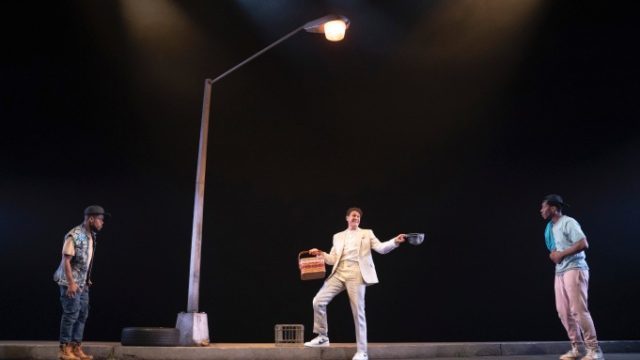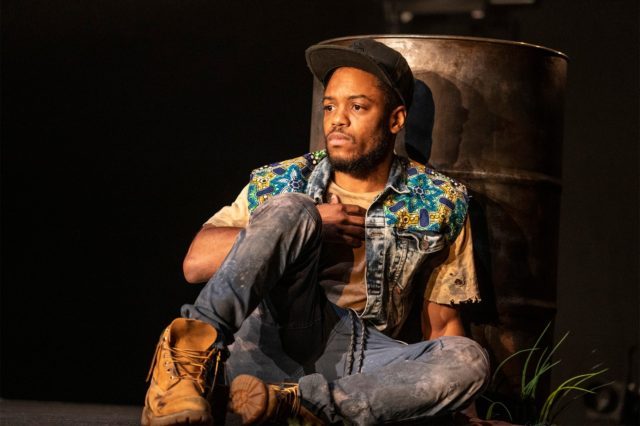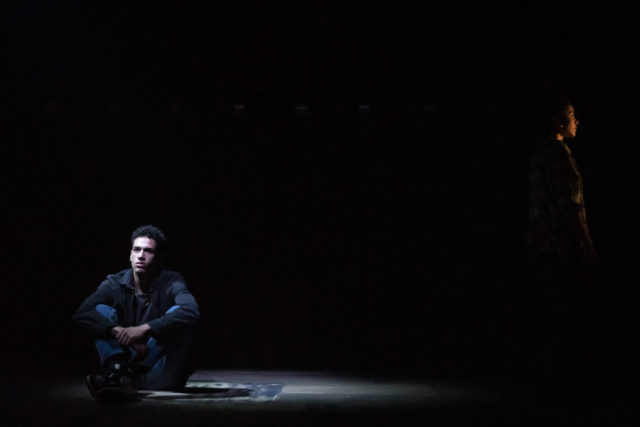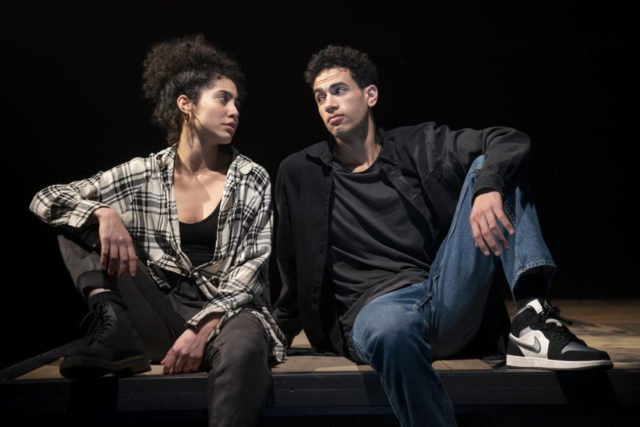
Moses (Jon Michael Hill) and Kitch (Namir Smallwood) are startled by the arrival of a white man (Gabriel Ebert) in Pass Over (photo by Joan Marcus)
PASS OVER
August Wilson Theatre
245 West Fifty-Second St. between Broadway & Eighth Ave.
Tuesday – Sunday through October 10, $39-$199
www.passoverbroadway.com
A pair of three-actor plays dealing with contemporary social issues, with spare sets and unique staging but curious endings, were among the first to open following the pandemic lockdown. Following earlier versions at Steppenwolf in Chicago in 2017 (which was filmed by Spike Lee) and at Lincoln Center’s Claire Tow Theater in the summer of 2018, Antoinette Chinonye Nwandu’s Pass Over, which deals with police brutality and the dreams of young Black men, made its Broadway debut at the August Wilson Theatre in August. Meanwhile, Martyna Majok’s Sanctuary City, a New York Theatre Workshop production at the Lucille Lortel, looks into the lives of DREAMers trying to stay in America.
Pass Over is a reimagination of Samuel Beckett’s Waiting for Godot filtered through the biblical story of the exodus of Jewish slaves from Egypt along with the fairy tale “Little Red Riding Hood.” Kitch (Namir Smallwood) and Moses (Jon Michael Hill) are like brothers, two men hanging out on a ghetto street, rambling on about life. Wilson Chin’s set is a slightly raised sidewalk with a few pieces of detritus and a central lamppost evoking Beckett’s tree. The script explains that the time is “the (future) present / but also 2021 CE / but also 1855 CE / but also 1440 BCE,” identifying Moses as “a tramp / a n*gga on the block / but also a slave driver / but also the prophesied leader of God’s chosen” and Kitch as “a tramp / a n*gga on the block / but also a slave / but also one of God’s chosen.” Moses, the wiser of the two, tells his best friend, “yo ass gon rise up to yo full potential too / gon git up off dis block / matter fact / man / i’m gon lead you.” Kitch replies, “Amen!”

Moses (Jon Michael Hill) searches for the promised land in Pass Over (photo by Joan Marcus)
They are surprised when a white man (Gabriel Ebert), dressed in a white suit like a plantation owner, suddenly arrives out of nowhere, holding a picnic basket and telling them his name is Master. “What da fuck,” Kitch says upon hearing that. Master, who uses such trite language as “gosh golly gee” and “salutations,” offers them food from the basket he was going to bring to his mother before getting lost, but while Kitch wants to dig in, Moses is suspicious of this unexpected largesse.
Shortly after Master departs, Kitch and Moses are visited by Ossifer (Ebert), a uniformed police officer who says he will protect them but soon pulls out his gun and commands that they put their hands behind their heads. When the cop leaves, Moses is furious, but Kitch philosophizes, “damn man / we still here / sun comin up yeah / iss a new day / and we still on dis block / but damn n*gga / it cud be worse / we cud be dead / we still here / mean we still livin / so tomorrow / tomorrow.”
Fluently directed by Danya Taymor and featuring three all-star performances, Pass Over is riding smoothly until the final scenes. Nwandu significantly changed the ending for Broadway, and not necessarily for the better. It now attempts to make a grander statement about the times we live in and a possible future, with an added dash of stagecraft that is beautiful but feels out of place. It might be more hopeful, but it’s head-scratchingly confusing and strays too far from the tight, succinct narrative that led up to it. In the script, Nwandu writes, “This play should NOT have an intermission. If Moses and Kitch cannot leave, neither can you. (And if, by the end, the magic has worked, you shouldn’t want to.)” The same should have gone for the finale.

Childhood friends B (Jasai Chase-Owens) and G (Sharlene Cruz) encounter immigration issues in Sanctuary City (photo by Joan Marcus)
SANCTUARY CITY
New York Theatre Workshop at the Lucille Lortel Theatre
121 Christopher St.
Tuesday – Sunday through October 17, $30 (20% off with code FRIEND)
www.nytw.org/show
Sanctuary City takes a head-scratching turn as well as the ending approaches, detracting from everything that came before it, which was powerful and moving, as is the case with Pass Over. The play takes place in Newark between 2001 and 2006, as childhood friends B (Jasai Chase-Owens) and G (Sharlene Cruz) contemplate their immigration status, wondering whether they should stay in the United States or move back to their native countries. They walk across Tom Scutt’s spare stage, a cantilevered platform that more than hints at unease. Isabella Byrd has filled the Lucille Lortel with standard and unusual varieties of lighting, on the floor, on the walls, on the ceiling, and in unexpected places. Various lights flash on and off after short scenes that sometimes repeat themselves and travel through time, reminiscent of Nick Payne’s Constellations on Broadway, which also had a set by Scutt (and lighting by Lee Curran).
“She’s goin back,” B says about his mother. “She’s afraid of stayin in the country. There’s some shit at work, she said. Boss keeps takin money from her tips cuz, y’know, he can, what’s she gonna do? report it? to who? And she’s afraid what happened to Jorge’s gonna happen to her and so she’s goin back. And cuz of September. Cuz of the towers.”
G spends a lot of time at B’s apartment, often sleeping over in order to avoid repeated beatings by her stepfather. She skips school, pretending to be sick, but she is running out of excuses. “She’s scared they’ll send us back if they find out what’s goin on at home. She’s scared they’d separate us,” she says about her mother. “Who would send you back?” B asks. G: “America. If they wanted to investigate. If they like — checked. She worked with a fake social security for years. He’s threatened to report her before. Everyone’s more, y’know—” B: “Yeah.” G: “—cuz of September. Cuz of the towers. Or maybe they’d put me in some kind of — some place for kids — separate us. I don’t know if she even knows specifically what to be afraid of but she is. She’s scared.”

Sharlene Cruz and Jasai Chase-Owens star in new play by Martyna Majok (photo by Joan Marcus)
Without the DREAM Act, they are always in danger of being deported, so they can’t apply for student aid or other benefits. Since she sleeps over so much, G offers to pay rent to help B out, but he refuses to accept it. They grow closer and closer and soon are asking each other personal questions about their lives, preparing to get married strictly so B can get a green card. While G looks like she might be interested in something more, B stands back, keeping things platonic. A few years later, Henry (Austin Smith) enters the picture, creating an entirely new dynamic.
Pulitzer Prize winner Majok (Cost of Living, Ironbound), who was born in Poland and contributed short works to A Dozen Dreams and the Homebound Project during the pandemic, and director Rebecca Frecknall (Summer and Smoke, Three Sisters) have our full attention for two-thirds of the play, maintaining a compelling mystery about B and G as well as numerous plot intricacies, and Chase-Owens (The Tempest, A Midsummer Night’s Dream) and Cruz (Mac Beth, The Climb) are appealing as the two leads.
It all comes to a screeching halt when Henry arrives, through no fault of Smith (An Octoroon, Socrates). “Did I just fuck everything up?” Henry asks. Till then, the play had avoided theatrical clichés, challenging the audience to keep pace. But from this point on, it all becomes standard, losing the edge that had made it so compelling. The flash lighting is gone, and instead of quick, staccato scenes with cut-off, incomplete dialogue, the scenes become longer and more drawn out, crossing every T and dotting every I. As with Pass Over, Sanctuary City pulls us into its claustrophobic, carefully built world but then, when opening up, leaves us behind, no longer trusting its own dialectic.